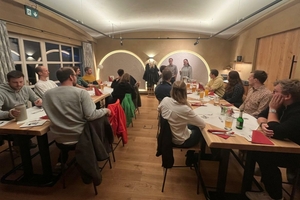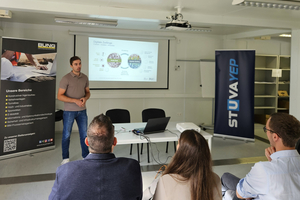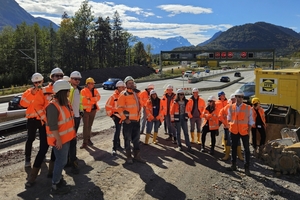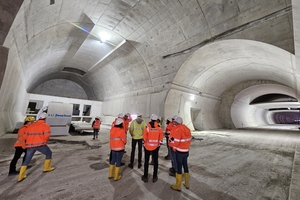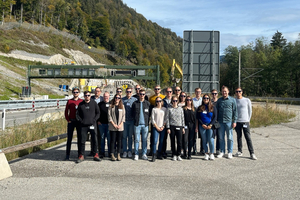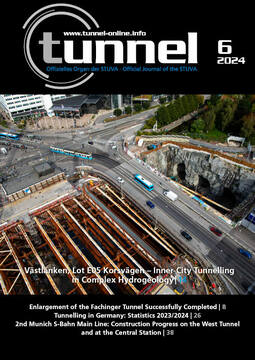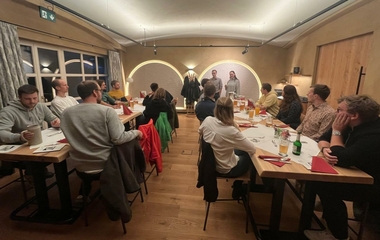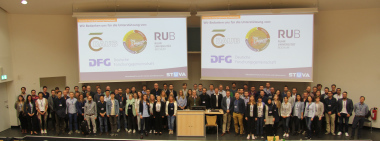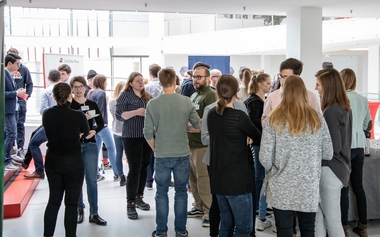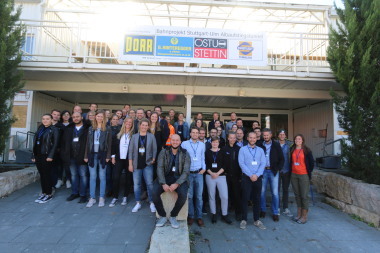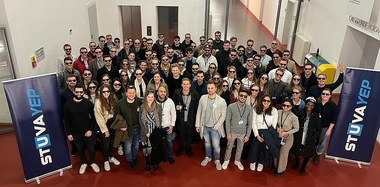STUVA-YEP Workshop at the Kramer Tunnel on the Subject of “Smart Tunnels – The Future”
On 7 September 2024, around 15 STUVA-YEPs and 10 speakers travelled to Garmisch-Partenkirchen for the workshop “Smart Tunnels – The Future” and the Kramer Tunnel construction site excursion. As usual, the event began on Sunday evening with a get-together. Thanks to the generous sponsorship of BUNG and BUNG-PEB, the participants were able to get to know each other over a dinner and start the conversations (Fig. 1).
The workshop day began with a joint bus journey to the construction office of the Weilheim State Building Authority in Oberau, which was our host as the client of the Loisachtal Tunnel Chain. The workshop began with a lecture and project presentation by Raphael Zuber, Head of Major Projects at the Weilheim State Construction Office. The participating YEPs were given an overview of current and planned tunnelling projects along the Loisach near Garmisch-Partenkirchen and were informed about the application of the BIM method in the planning, execution and operation of the tunnels.
The application of the BIM method across all project phases was the core of the presentations, as BUNG-PEB is working very actively on digital solutions for the operational phase of the tunnels in collaboration with the Weilheim State Building Authority.
Following the project presentation, Karl Hanke, Head of BIM Process Management, and Simon Böhmer, Project Engineer at BUNG, presented the digital solutions for the operating phase of the Kramer Tunnel. Although the tunnel is still in the construction phase, a pilot project is being carried out to digitalise the maintenance cycles and maps.
Presentations on Digital Twins and Data Collection During Tunnelling
This was followed by a presentation of the “Didymos” research project (Fig. 2), which is being carried out by BUNG-PEB in cooperation with the Ruhr University Bochum. The project is investigating the possibilities of creating digital twins of existing tunnels with as little resources as possible. The tasks range from fundamental questions of the necessary level of detail of the digital twins to the automated AI-based recognition of tunnel equipment through video inspections. Maximilian Lucht, project engineer, and Dr. Annika Jodehl, project engineer, are responsible for the research project at BUNG-PEB.
These presentations on research, planning and the operational phase of tunnels were followed by information on the construction of tunnels and the associated data collection and analysis on current projects. André Wesch, Head of BIM Tunnelling Germany at Implenia, presented examples of how data is collected on the VE41 Marienhof, TELT (France) and the second Gotthard tube (Switzerland) projects. On the basis of this data, tunnelling inspections can be carried out and excvation rates checked. A special field of development is the automated creation of models from machine data to evaluate the TBM drive and to analyse and validate the tunnelling data.
To conclude the presentations, Hannah Salzgeber and Prof. Dr. Matthias Flora from the University of Salzburg outlined the current state of research and standardisation on the topic of digital twins. The main focus was on the distinction between digital model, digital shadow and digital twin. The various stages of digital models differ in the direction of data transfer from the real object to the digital model and back. The final development stage “the digital twin” is only reached when the control of the tunnel equipment is also automated.
During the lunch break, the participants were informed about upcoming STUVA-YEP events. In particular, reference was made to the upcoming factory visit to Herrenknecht AG in Schwanau on 31 March 2025. All interested parties should make a note of this date now. More detailed information on registration will follow shortly via the channels listed below.
Auerberg Tunnel and Kramer Tunnel Site Visits
The lunch break was again sponsored by BUNG and all participants were provided with packed lunches. After the lunch break, the site inspections could begin as soon as the participants had donned the appropriate protective equipment (Fig. 3). The pre-cut of the Auerberg tunnel is already under construction right next to the Oberau construction office. Extensive special civil engineering work and slope stabilisation are being carried out here in order to construct the southern breakthrough wall for the Auerberg Tunnel.
Afterwards, all participants travelled together by bus to the north portal of the Kramer Tunnel in Garmisch. As work in the Kramer Tunnel is currently suspended, all sections could be visited, i.e. both the main tunnel and the rescue tunnel. Areas with different degrees of completion could be inspected, e.g. completed inner lining, completed sealing work or sections with sprayed concrete support only. The dimensions of the ventilation cavern at around tunnel metre 1000 once again impressed all participants at the end (Fig. 4).
Generally, the day was divided into a morning with interesting presentations on digitalisation and data management in tunnel projects, and exciting construction site visits in the afternoon. STUVA-YEP would once again like to thank the host, the Weilheim State Building Authority, for the presentations and facilities and BUNG and BUNG-PEB for organising and sponsoring the workshop.
If this workshop has aroused your interest, we look forward to hearing from you at . All other events will be announced in good time on the STUVA website (www.stuva.de, About us, STUVA-YEP) in our newsletters and via our social media channels Instagram and LinkedIn.
Michael Sedlacek, Ruben Deckers

